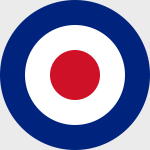Corgi AA32818 RAF De Havilland Mosquito Mk. VI Fighter-Bomber - HR405, No.143 Squadron, RAF Banff Strike Wing, February 1945 (1:72 Scale)
"The essence of leadership . . . was, and is, that every leader from flight commander to group commander should know and fly his airplanes."
- Air Vice-Marshal J. E. 'Johnnie' Johnson, RAF
 The "Mossie," as it was known affectionately by its British crews, was both simple in construction and design. It was a twin engine, single boom aircraft that placed the pilot and navigator in a side-by-side sitting configuration. The Mosquito was one of the most cost effective aircraft ever built because it was constructed out of wood. Balsa was used for the plywood skin, Sitka spruce from Alaska and British Columbia for the wing spars, and Douglas Fir stringers and birch and ash for the longitudinal pieces. These were all held together with glue and wood screws. The result was an airplane that was easy to maintain, tolerant of battle damage, and simple to patch. It was faster than the Spitfire, flew higher than almost any other aircraft, and carried tremendous firepower over great distances. The bomber version operated with relative impunity over Germany til the end of the war, because the Luftwaffe never had a nightfighter fast enough to intercept it. Interestingly, the nightfighter versions of the Mosquito remained in production until 1947, two years after the war in Europe had ended.
The "Mossie," as it was known affectionately by its British crews, was both simple in construction and design. It was a twin engine, single boom aircraft that placed the pilot and navigator in a side-by-side sitting configuration. The Mosquito was one of the most cost effective aircraft ever built because it was constructed out of wood. Balsa was used for the plywood skin, Sitka spruce from Alaska and British Columbia for the wing spars, and Douglas Fir stringers and birch and ash for the longitudinal pieces. These were all held together with glue and wood screws. The result was an airplane that was easy to maintain, tolerant of battle damage, and simple to patch. It was faster than the Spitfire, flew higher than almost any other aircraft, and carried tremendous firepower over great distances. The bomber version operated with relative impunity over Germany til the end of the war, because the Luftwaffe never had a nightfighter fast enough to intercept it. Interestingly, the nightfighter versions of the Mosquito remained in production until 1947, two years after the war in Europe had ended.
Pictured here is a 1:72 scale replica of a RAF De Havilland Mosquito Mk. VI fighter-bomber that was attached to No.143 Squadron, then part of RAF Banff Strike Wing, in February 1945.
Sold Out!
Dimensions:
Wingspan: 9-inches
Length: 6-3/4-inches
Release Date: January 2010
Historical Account: "Strike While the Iron is Hot" - RAF Banff was built for Coastal Command in 1942 in order to allow anti-shipping and anti-U boat operations over the North Sea and around the coast of Norway. From October 1944, the Banff Strike Wing operated mainly with Mosquitoes. The Strike Wing crews often ran the gauntlet of heavy anti-aircraft fire as they penetrated deep into heavily defended Norwegian Fjords to attack shipping targets at anchor.
The Wing achieved outstanding success but at a heavy loss with over 80 crews lost during the last months of the War.
143 Squadron arrived at Banff in October 1944, operating Beaufighters but quickly converted to Mosquitoes. The 25lb AP rocket armed Mosquito FB MkVI HR405, NE-A was flown by Squadron Leader David Pritchard DFC for a photo shoot in February 1945 and is therefore a well photographed aircraft. Its combat history is a little sketchier but it is known to have been involved in the famous Banff Wing battle with FW190s of JG5 on March 23rd, 1945, and it was unquestionably a real Banff veteran, serving with the Strike Wing from September 1944 until the end of the War when it transferred to 14 Squadron.






![German Kriegsmarine Deutschland Class Heavy Cruiser - DKM Deutschland [a.k.a. Lutzow] (1:1250 Scale)](http://cdn4.volusion.store/qh9e9-jdqv9/v/vspfiles/photos/DAKS09-1.jpg?v-cache=1740197136)

![USMC Chance-Vought F4U-1D Corsair Fighter - Lt. Dean Caswell, VMF-221, USS Bunker Hill (CV-17), 1945 [Signature Edition] (1:48 Scale)](http://cdn4.volusion.store/qh9e9-jdqv9/v/vspfiles/photos/HA8212A-1.jpg?v-cache=1740197136)
